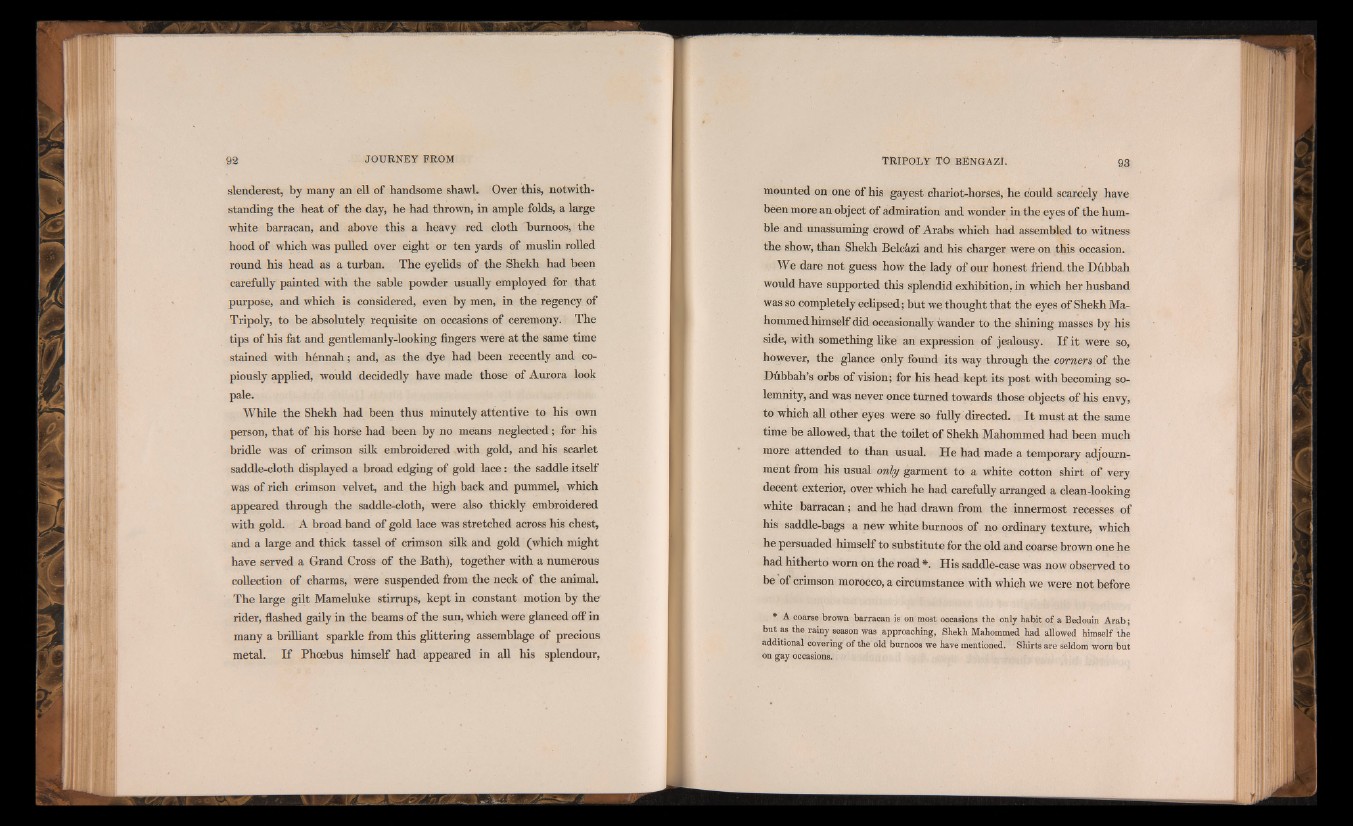
slenderest, by many an ell of handsome shawl. Over this, notwithstanding
the heat of the day, he had thrown, in ample folds, a large
white barracan, and above this a heavy red cloth burnoos, the
hood of which was pulled over eight or ten yards of muslin rolled
round his head as a turban. The eyelids of the Shekh had been
carefully painted with the sable powder usually employed for that
purpose, and which is considered, even by men, in the regency of
Tripoly, to be absolutely requisite on occasions of ceremony. The
tips of his fat and gentlemanly-looking fingers were at the same time
stained with hfennah; and, as the dye had been recently and copiously
applied, would decidedly have made those of Aurora look
pale.
While the Shekh had been thus minutely attentive to his own
person, that of his horse had been by no means neglected; for his
bridle was of crimson silk embroidered with gold, and his scarlet
saddle-cloth displayed a broad edging of gold lace: the saddle itself
was of rich crimson velvet, and the high back and pummel, which
appeared through the saddle-cloth, were also thickly embroidered
with gold. A broad band of gold lace was stretched across his chest,
and a large and thick tassel of crimson silk and gold (which might
have served a Grand Cross of the Bath), together with a numerous
collection of charms, were suspended from the neck of the animal.
The large gilt Mameluke stirrups, kept in constant motion by the
rider, flashed gaily in the beams of the sun, which were glanced off in
many a brilliant sparkle from this glittering assemblage of precious
metal. I f Phoebus himself had appeared in all his splendour,
mounted on one of his gayest chariot-horses, he could scarcely have
been more an object of admiration and wonder in the eyes of the humble
and unassuming crowd of Arabs which had assembled to witness
the show, than Shekh Belcazi and his charger were on this occasion.
We dare not guess how the lady of our honest friend, the Dtibbah
would have supported this splendid exhibition, in which her husband
was so completely eclipsed; but we thought that the eyes of Shekh Ma-
hommed himself did occasionally wander to the shining masses by his
side, with something like an expression of jealousy. I f it were so,
however, the glance only found its way through the corners of the
Dfibbah’s orbs of vision; for his head kept its post with becoming solemnity,
and was never once turned towards those objects of his envy,
to which all other eyes were so fully directed. I t must at the same
time be allowed, that the toilet of Shekh Mahommed had been much
more attended to than usual. He had made a temporary adjournment
from his usual only garment to a white cotton shirt of very
decent exterior, over which he had carefully arranged a clean-looking
white barracan; and he had drawn from the innermost recesses of
his saddle-bags a new white burnoos of no ordinary texture, which
he persuaded himself to substitute for the old and coarse brown one he
had hitherto worn on the road *. His saddl6-case was now observed to
be of crimson morocco, a circumstance with which we were not before
* A coarse brown barracan is on most occasions the only habit of a Bedouin Arab;
but as the rainy season was approaching, Shekh Mahommed had allowed himself the
additional covering of the old burnoos we have mentioned. Shirts are seldom worn but
on gay occasions.